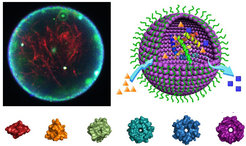New Max Planck-Bristol Centre for Minimal Biology announced

Interfaces of matter and life are the focus of the new Max Planck Bristol Centre for Minimal Biology.
Scientists from across the University and Max Planck Society will work together in an interdisciplinary way, focusing on the development of new cell-like entities and adding new functions to living cells. As an emerging field of science, the applications in minimal biology are wide-ranging and pave the way for new therapies that could see artificial cells programmed with specific properties to rescue diseased cells and tissue, and the engineering of bacterial and mammalian cells to improve the production of pharmaceuticals. Training the next generation of scientists to work between the physical and life sciences will be a core mission of the new Centre, which is expected to become fully operational in 2019.
Led by Professors Imre Berger (Biochemistry), Stephen Mann (Chemistry) and Dek Woolfson (Chemistry and Biochemistry) at the University of Bristol, and Professors Joachim Spatz, Tanja Weil and Petra Schwille in Germany, the new Max Planck Centre will focus on several key areas. These include synthetic nanoscale biology, implementing custom-designed functionalities in proto- and living cells, tissues and ultimately organisms; protein design in living cells, whereby completely new proteins will be designed from scratch to operate alongside natural proteins; and biomedical genome intervention by engineering synthetic, virus-derived, programmable nano-devices with unprecedented capacity to enhance and repair genomes.
Professor Hugh Brady, Vice-Chancellor and President of the University of Bristol, said: “Bristol’s expertise in biodesign means it is perfectly placed to partner with the Max Planck Society and pioneer this new frontier in science. This Centre reinforces the University’s commitment to world-class research and the international partnerships that underpin it.”
Stephen Mann, Director of the Centre for Protolife Research and Professor of Chemistry considers this partnership an unprecedented opportunity to forge a pathway to the physical realization of a rudimentary proto-living system, offering many avenues for collaboration on the subject of synthetic cellularity and protobiology: “Combining our expertise in the chemical design and bottom-up construction of synthetic protocells with the elegant micro-engineering tools and microfluidic devices developed by our German partners, provides a unique approach to new breakthrough knowledge and applications.” Imre Berger, Professor of Biochemistry and Director of Bristol Synthetic Biology, added: “A paramount objective of the new Centre will be to train early career scientists in minimal biology and biodesign, preparing the next generation of scientists to tackle the fundamental question of how matter becomes alive.” Dek Woolfson, Professor of Chemistry and Biochemistry and Director of the Bristol BioDesign Institute, explained: “If we can harness the commitment and sense of adventure in the Max Planck-Bristol Centre for Minimal Biology, we will create an exceptional environment to tackle exciting and cutting-edge scientific challenges at the interface between chemistry and biology.”
Professor Joachim Spatz, Director at the Max Planck Institute for Medical Research and the new Max Planck School “Matter to Life” spokesperson, which is closely related scientifically to the new Centre for Minimal Biology, explained: “We will strive to answer the question of what the defining principles of life are and how they may be partly engineered from molecular systems, chemistry and physics. These are some of the foremost scientific challenges of our time.”
The Max Planck-Bristol Centre for Minimal Biology will be inaugurated officially in 2019.
Further information:
What is Minimal Biology
Minimal biology is an emerging research field at the interface between the physical and life sciences. It applies principles and methods from the former to construct new systems that mimic or augment living cells and organs.
